While disparities already existed between men and women, the past year has created an even bigger gulf of inequality, as the pandemic has shifted greater burdens onto women in terms of workloads, job losses, and their physical and mental health.
In addition to revealing existing inequality, the pandemic has also increased women’s vulnerability. Given that they are more likely to experience poverty and insecurity, many women are not in a good position to cope with the adversity of the crisis. Yet women are mostly the ones holding Greater Montreal together by providing care, education, food, and support.
Women: a group already at greater risk of poverty and social exclusion”
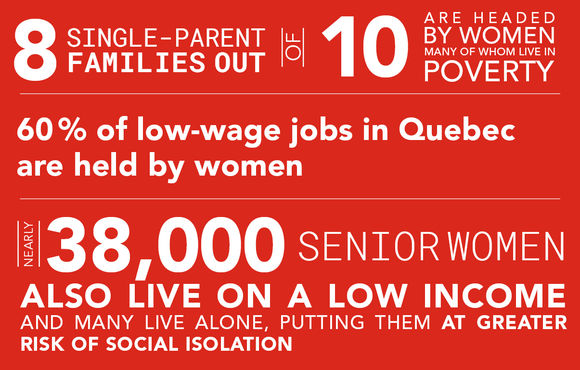
Inequality reinforced by the pandemic
- Employment and reduced income
- Higher health risks
- Greater share of family caregiving
- Vulnerable mental health
- Increasing situations of violence and exploitation
Employment
Quicker job losses with a slower recovery”
While the start of the crisis affected male-dominated employment sectors such as construction and manufacturing, women have been more affected by job losses overall, and their economic prospects had a rocky recovery in the spring and summer.
- 69% of people in Quebec who lost their jobs between February and March 2020 were women (120,200 women compared to 55,100 men)
- More women have reduced their working hours
- Many women (over 25 years of age) have left the labour market or given up trying to find employment after losing their jobs, particularly to take on more parenting duties.
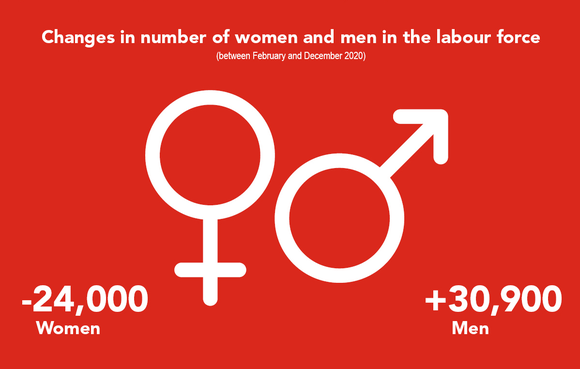
will have long-term effects that can’t yet be measured.
Work-life balance
A heavier burden for women to carry”
More so than men, women have had to juggle multiple tasks during the pandemic, such as schooling their children, performing more child care, as well as supporting aging parents. This pressure and stress seem to have weighed more heavily on women, tipping the scales of an already uneven workload even more to their side.
Mental health
Women more psychologically affected”
Different types of studies and surveys conducted during the pandemic suggest that women have been more affected psychologically. They report poorer mental health, such as anxiety, stress, feelings of powerlessness, and fear.
Particularly affected groups:
- Mothers, especially those with young children
- Young women
- Pregnant women
- Indigenous women
- Racialized women
Close-up on psychological distress*
- 28% of mothers versus 17% of fathers.1
- 37% of mothers of young children (age 5 and under).1
- 28% of all parents of young children.1
- 37% of women aged 18 to 34 compared to 26% of men the same age.2
- 41% of single-parent families compared to 20% of two-parent families.2
- 64% of Indigenous women (compared to 54% of their male counterparts) have reported deteriorated mental health due to the health crisis.3
*This data does not come from the same sources and are drawn from surveys. They therefore cannot be generalized to the entire population.
- SOM survey conducted across Quebec for the Regroupement pour la Valorisation de la Paternité (RVP), July 2020.
- Léger survey conducted in partnership with the Association for Canadian Studies, and a Léger survey, January 13, 2021.
- Statistics Canada, June 23, 2020.
Our investments to support women
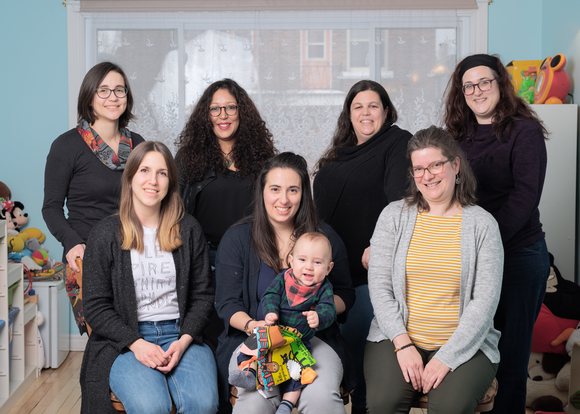
A network of agencies led and used mainly by women
Nearly $50 million is invested annually in 350 agencies and projects. Women go to these agencies to receive help in different areas of their lives: housing, food, access to support networks, their children’s success, and inclusion (for more vulnerable women).
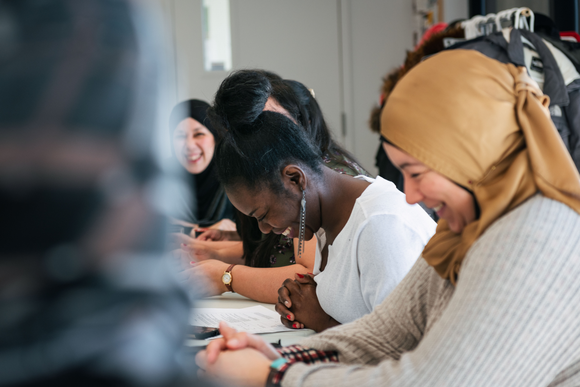
A network of women’s centres set up in Greater Montreal’s neighbourhoods and cities
The 350 agencies supported by Centraide include a network of about 20 women’s centres throughout the territory. An annual investment of $2 million allows them to help 75,000 women.
These agencies act on realities specific to women and offer a range of services adapted to their needs in different aspects of their lives. They also work with the community through awareness and anti-discrimination initiatives.
The centres offer services for women, such as discussion groups and support workshops on topics such as housing, violence, immigration and sexual assault. They run computer and budgeting classes and may also offer support to help women return to school, settle in a new place, deal with mental health issues, or work on a personal or collective project that helps them develop their skills and self-esteem.
Women’s centres are also places where people can come together to create support networks and develop a sense of belonging to the community.
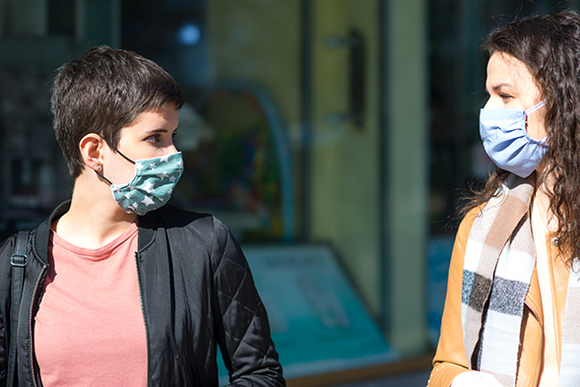
Helping women during a pandemic, the example of the Centre des femmes d’ici et d’ailleurs”
Located in the east sector of Villeray near Saint-Michel, the Centre des femmes d’ici et d’ailleurs offers support, referrals, listening and a meeting place to women from all backgrounds.
the wake of the pandemic and required health measures, the Centre set up a virtual videoconferencing service after buying computer equipment with the help of Centraide, whose support also allowed the agency to lend laptops with built-in Internet capabilities to women who lacked access to these devices for myriad reasons.
To help more isolated women who have never received support, the agency also adapted its practices in the field and found new ways of doing things. For example, since the fall, it has been offering a walk-and-talk service. At their convenience, in the outdoor location of their choice (park, public place), and in compliance with health rules, women can meet with a counsellor who can help them and refer them to the appropriate support resources. Women who use this service experience a range of problems, from family violence and mental health issues to parental challenges.
Some results and impacts
- 60 walk-and-talks from October to February
- Decrease in isolation, anxiety and stress
- Decreased sense of fear
- Increase in physical activity
- Discovery of the neighbourhood and public spaces
- Information collected about COVID and resources



